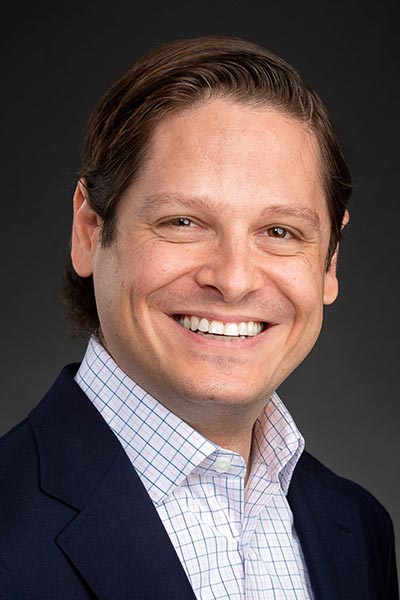Adam Durbin, MD, PhD
Spotlight on the AACR NextGen Stars Class of 2025
Since 2014, the American Association for Cancer Research (AACR) has provided the opportunity for graduate students, postdocs, and assistant professors to give high-profile presentations at the AACR Annual Meeting as part of its NextGen Stars Program. This year, 11 early-career researchers were selected based on their outstanding applications.
Learn more about one of the newest NextGen Stars below, and check out the Q&As with other members of the NextGen Stars Class of 2025.
Adam Durbin, MD, PhD
AACR NextGen Stars Class of 2025
Assistant Member
St. Jude Children’s Research Hospital, Memphis, Tennessee
Abstract Presentation:
A genome-derived non-coding reporter of dynamic cancer cell state permits dissection and control of intratumoral heterogeneity and chemoresistance
Session Details:
SY13 – Unmasking Resistance: Deciphering Mechanisms and Charting New Frontiers in Cancer Therapies
Monday, April 28, 10:15-11:45 a.m. CT
Room S401, McCormick Place South (Level 4)
What is the subject of your research?
My lab predominantly focuses on studying transcription and epigenetics. I’m a pediatric oncologist, so we primarily focus on diseases of childhood, in particular neuroblastoma and other solid tumors, where these processes are critical. Most kids with high-risk neuroblastoma have an overall survival between 50% and 60%, so we’re driven to understand new ways to treat this disease. We’ve been fascinated by the idea that this disease has a very low mutational burden and how transcription factors and epigenetic proteins control malignant properties within the cell.
Based on our earlier work, we’ve now developed a new system to monitor epigenetic state in real time. This has allowed us to examine a new approach to reprogram cells for epigenetic therapy, with the idea that we can boost the effects of conventional chemotherapies, immunotherapies, or radiation by reprogramming the cells to become more sensitive to those treatments or those modalities in general. Essentially, our system helps to identify these cells that express different transcriptomes and have different malignant properties using a flexible reporter, and from there we can figure out ways of interconverting from chemoresistance to more chemosensitivity in these cells.
What sparked your interest in this area of research, and why is it important?
When I was in clinical training, I was struck by several of the young kids I was taking care of, which led me to focus on studying pediatric solid tumors. The laser focus on neuroblastoma came from a young boy I was treating who passed away from the disease. While I felt a need to help others with neuroblastoma, I also recognized that neuroblastoma can be a model for thinking about how to target many other pediatric solid tumors since they share a lot of similarities, including low mutational burden and a heavy reliance on transcription and epigenetics. So if we can uncover the general properties within these tumor cells that are applicable beyond neuroblastoma-specific cases, then hopefully we can apply that to help treat many other tumor types as well.
What (or who) inspired you to apply for the NextGen Stars program?
I’ve been lucky. I’ve had great mentors at multiple stages, including my PhD mentor, David Malkin, MD, FAACR, and my postdoc mentor, Tom Look, MD, FAACR. But the person who encouraged me to apply for this program was Charlie Roberts, MD, PhD, an investigator here at St. Jude who is a close faculty mentor of mine. He has been supportive of me and the stuff we’re doing for many years. He thought that this would be a good place to put in an application and see what happens. I did not expect to be selected. I’ve seen the work from the people who have been nominated and have been NextGen Stars in the past and it’s phenomenal, so I am super appreciative to be included this year.
What do you hope to take away from your experience as a NextGen Star and your time at the AACR Annual Meeting 2025?
It’s a great opportunity to network and meet other people. It’s also an incredible opportunity to have such a great platform to show off work that we think is really cool and important. This meeting will help to make connections that would allow us to expand the reach of what this system and our research can do.
Follow Along with the AACR Annual Meeting 2025
Keep up with the latest from the AACR Annual Meeting 2025, whether you are attending in person or virtually. Join the conversation on social media using the hashtag #AACR25 and read more coverage of upcoming sessions in AACR Annual Meeting News.


